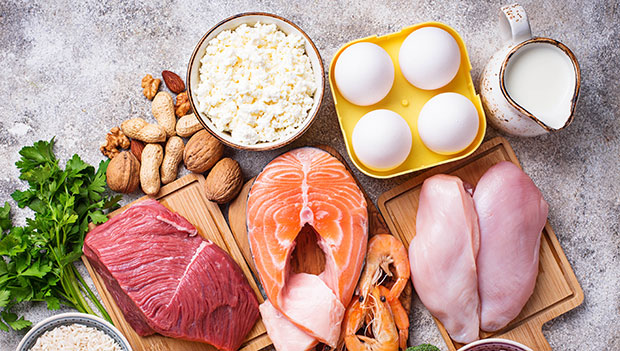
What Are Vitamins | Nutrient-Dense Foods | Fat-Soluble Vs. Water-Soluble Vitamins | Best Vitamin D Supplements | Best Magnesium Supplements | Best Iron Supplements | Best Vitamins for Energy | Best Beet Supplements | Best Vitamin B12 Supplements | Best Calcium Supplements
Some vitamins are best taken with food. Why? What's the actual difference between water-soluble and fat-soluble vitamins and why does it matter? This article is a deep dive into vitamins, helping you distinguish between the different types and find out what they do and how they are best taken.
What Are Fat-Soluble Vitamins?
Vitamins A, D, E, and K are fat-soluble vitamins. This means they are more easily absorbed when consumed with dietary fat and they are stored in the body's fat tissues. Because they are stored in the body, fat-soluble vitamins are also more likely to reach toxic levels in the body when high amounts of these vitamins are consumed consistently over time. Or, in some cases, a single massive supplemental dose can lead to toxic levels of the vitamin. Fat-soluble vitamins play roles in several physiological processes including vision, bone health, immune function, and blood clotting.
What Are Water-Soluble Vitamins?
Water-soluble vitamins are dissolved in water when they enter the body, so they are not stored for later use (with the exception of vitamin B12). Any excess is excreted in the urine and therefore they are less likely to increase to toxic levels in the body. Although they must be consumed regularly to avoid a deficiency, deficiency of any of the water-soluble vitamins is rare in North America. However, those with alcohol use disorder, those who are malnourished, and anyone with a malabsorption issue or disease that causes malabsorption may need vitamin supplements to avoid deficiency, as their body may not absorb adequate amounts of certain vitamins.
Which Vitamins Are Fat Soluble?
Vitamins A, D, E, and K are fat-soluble. Vitamin A is important for immune and cell health, healthy eyesight, and bone health. There are two forms of vitamin A—preformed vitamin A and provitamin A carotenoids. Preformed vitamin A is found in animal foods such as dairy, fish, eggs, and organ meat. Provitamin A carotenoids are plant pigments converted to vitamin A in the intestine. However, our bodies vary in how well we convert carotenoids to vitamin A.

Vitamin D is in a few foods, though it can also be made in your body when your skin is exposed to sunlight. This vitamin is needed for strong bones and teeth, metabolism, neuromuscular functioning, and immune health. In fact, research shows a relationship between vitamin D deficiency and increased incidence of respiratory tract infections in adults. Many adults have insufficient or deficient levels of vitamin D and need supplements to reach sufficiency.
There are eight chemical forms of vitamin E, although we only know a good amount about one form. One of the primary roles of vitamin E is as a free-radical scavenger, helping protect the body from free-radical damage. Free radicals are compounds that are necessary for life, but in excess, they can damage the body. Vitamin E is also essential for immune functioning, cell signaling, and gene expression. Vitamin E is primarily found in nuts, nut butters such as peanut butter, seeds, and oils. While population-based surveys suggest many people don't get enough vitamin E in their diet, these surveys don't account for vitamin E-enriched oil that is added to many foods and the oil that foods are cooked in.
Like vitamin D, vitamin K can also be made in the body. Vitamin K is necessary for blood clotting and bone health. It can be made by bacteria in the gut and also consumed through dark green leafy vegetables, natto (traditional Japanese food made from fermented soybeans), edamame, and pumpkin, as well as fats and oils including canola and soybean oil.
Which Vitamins Are Water Soluble?
Vitamin C and B vitamins including thiamine, riboflavin, niacin, pantothenic acid, pyridoxine, biotin, folate, and cobalamin are water-soluble vitamins. Choline is a water-soluble compound that, although not technically a vitamin, is typically grouped with water-soluble vitamins. Vitamin C and B vitamins are found in an abundant array of foods, making it fairly easy to meet your needs for these nutrients. Also, because these vitamins are found in so many foods, deficiency is rare in North America. However, those with malabsorption syndromes, anyone following a vegan diet, and those with alcohol use disorder are more prone to deficiency.
Vitamin C is important for building collagen, the primary protein found in tendons, ligaments, and bones. It is also needed for wound healing, bone formation, immune system health, iron absorption, and blood vessel health. Additionally, like vitamin E, vitamin C is an antioxidant that protects the body from damage. A deficiency in this vitamin is rare, though it can lead to swollen and bleeding gums, loss of teeth, and poor wound healing. Vitamin C is primarily found in vegetables and fruits. Vitamin C levels in food decline when foods are cooked on high heat or cooked for a prolonged period of time. Vitamin C is also lost in the water food is cooked in and lost when food is exposed to heat and light after cooking.
B vitamins are important for metabolism, vision and skin health, digestion, brain health, heart and nerve functioning, red blood cell production, and nervous system health. B vitamins are found in whole grains, eggs, fruits, meat, poultry and fish, liver, and fortified breakfast cereals. B vitamins, except vitamin B12, are also lost in water during cooking and lost when foods rich in B vitamins are exposed to heat.
The Difference Between Fat-Soluble and Water-Soluble Vitamins
In addition to differences in how they are transported in the body and stored, fat-soluble and water-soluble vitamins also differ in how they are tested. Because they are stored in the body's tissues, it is easier to test for levels of fat-soluble vitamins within the body. Although there are plenty of serum blood tests claiming to tell you about your vitamin levels, these only tell you about the amounts of water-soluble vitamins circulating in the body at the time of testing. They can't tell you about a deficiency. Instead, more advanced testing is required.
The best way to meet all of your vitamin and mineral needs is by consuming a nutrient-rich diet including unprocessed and less processed foods from the main food groups and subgroups as identified by the Dietary Guidelines for Americans:
- Fruits
- Vegetables: dark-green, red/orange, beans and peas, starchy, and other
- Dairy: including calcium-fortified soy beverages
- Grains: whole grains and refined grains
- Proteins: meats, poultry, and eggs; seafood; nuts, seeds, and soy products
Vitamin and mineral supplements and fortified foods can all be used to fill in nutrient gaps. However, it is important to ensure you are taking a supplement without very high amounts of fat-soluble vitamins to avoid toxicity. While there is less concern about toxicity with water-soluble vitamins, taking excess amounts of these nutrients, more than necessary for general health or specific health concerns, isn't recommended.
What Are Vitamins | Nutrient-Dense Foods | Fat-Soluble Vs. Water-Soluble Vitamins | Best Vitamin D Supplements | Best Magnesium Supplements | Best Iron Supplements | Best Vitamins for Energy | Best Beet Supplements | Best Vitamin B12 Supplements | Best Calcium Supplements


